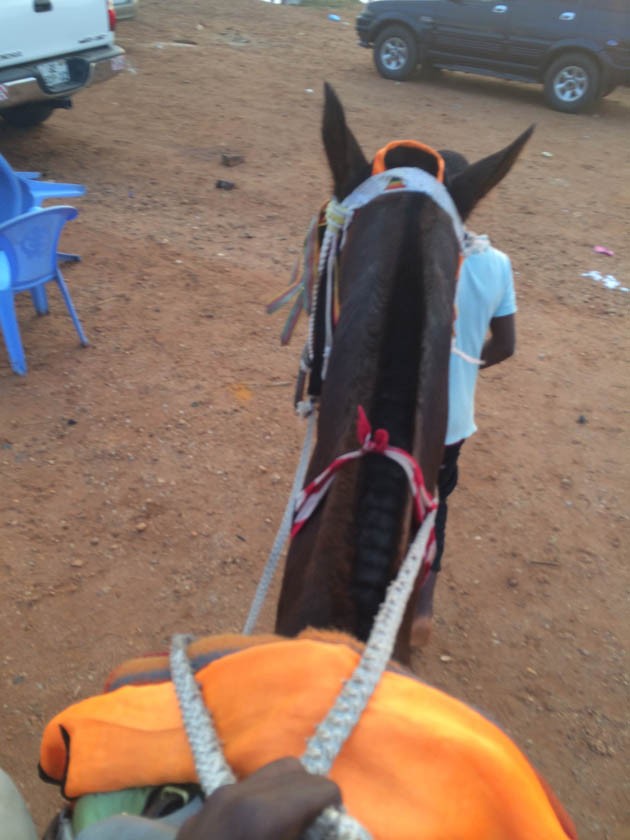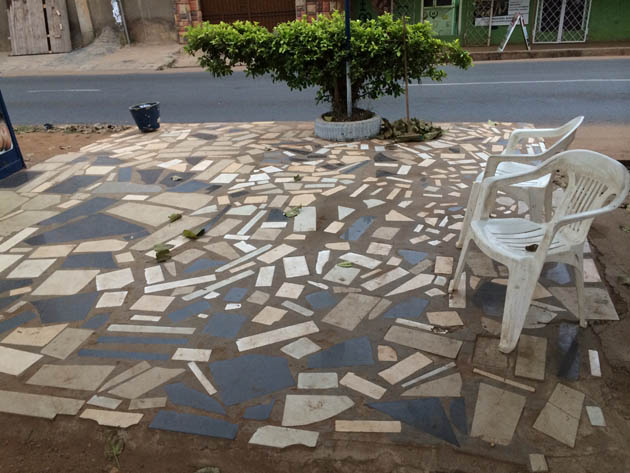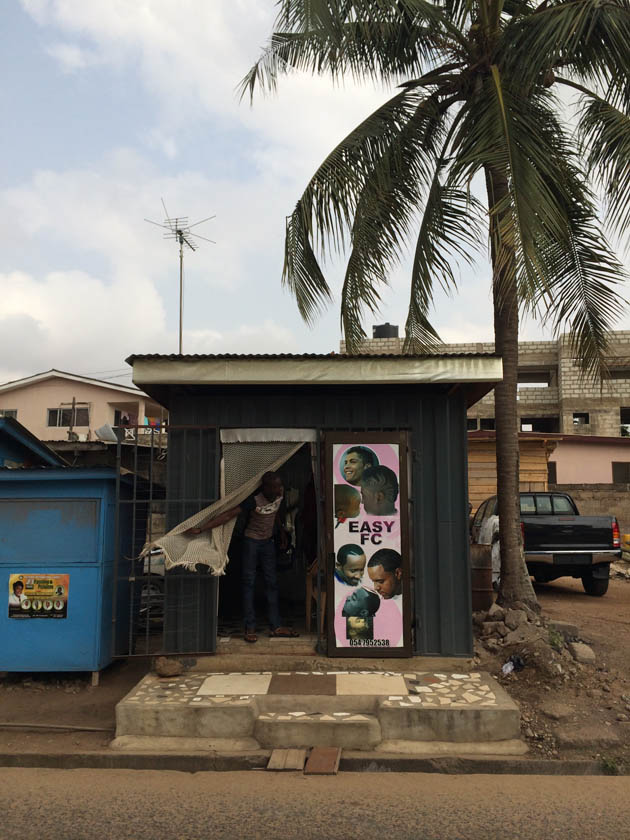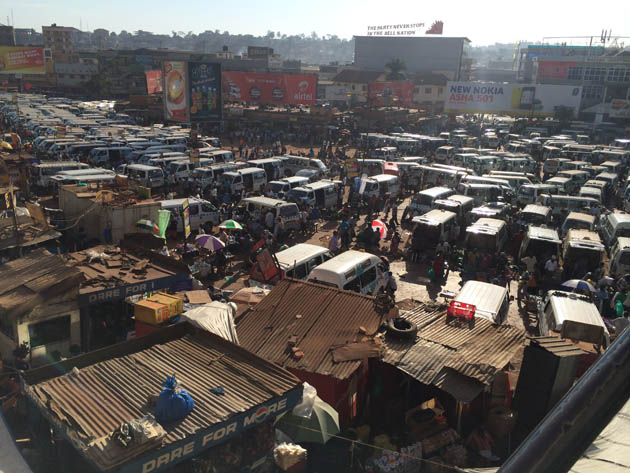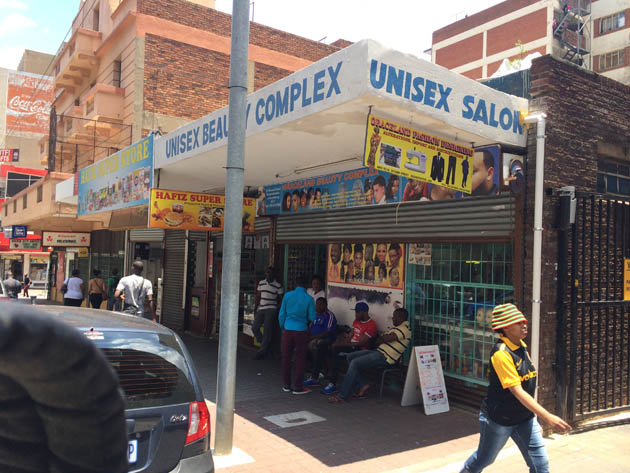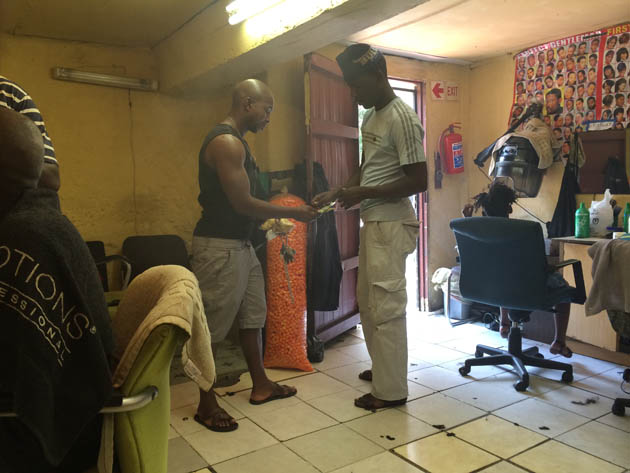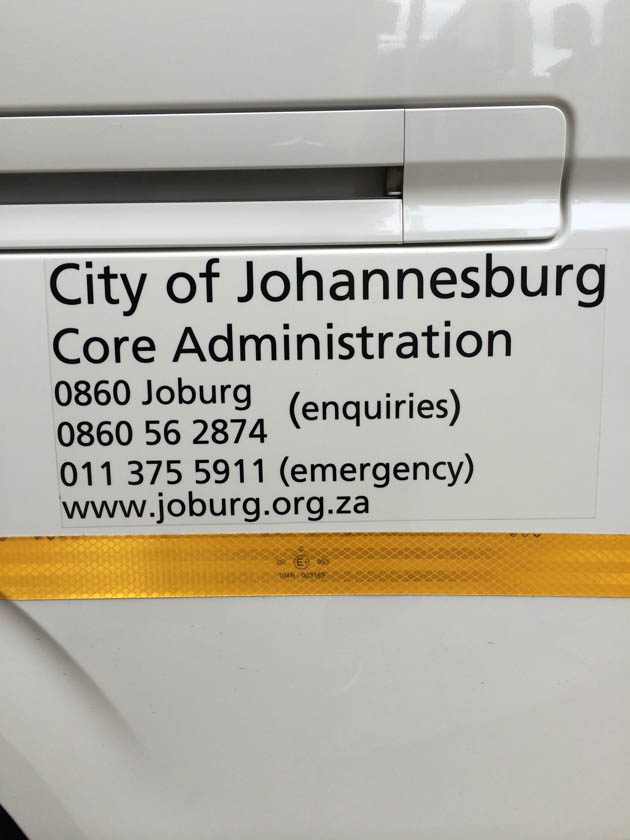On the 7th of December, I left London to travel through SubSaharan Africa for six week researching a play about barber shops. The project is supported by The Binks Trust, The British Council and Fuel Theatre Limited. This is the sixth, the last of six journey-logs.
Barber Shop Chronicles / 12 January / Ghana
The Sunday I arrive in Ghana, I spend with a friend's mother. Aunty Mary is her name and she reminds me of my own mother. There is her endless generosity, her fireplace-warmth, the glowing pride she has of her son and her faith in Christianity. Aunty Mary ensures I am fed as though food is her only form of communication and she has novels to tell. When I am done with the plate of rice, I fall to sleep in the dizzying afternoon heat, exhausted from the gauntlet that was getting out of Nigeria. Hours later, early in the eve, when the sun is dozing on the horizon and a light breeze is cooling its day's work, Aunty Mary suggests we go to the beach and my first introduction to Ghana is this ten minute drive through her neighbourhood, past local salons, large churches, wooden restaurants on the beachfront and the beach itself: the couples and families chasing each other where the waves meet the shore, the roasted meat and sausages sold by food hawkers, the eight year old boy selling horse-rides on the brown stallion tied to his waist, and Ghana's gentle, far saner pace of African life.
The following day, 13th of Jan, I wake early and go out to visit the neighbourhood on foot. It is a small, tight-knit community where I imagine everyone knows everyone else's business. Opposite Aunty Mary's house, a church, the third on the unpaved rocky road is being built. At the bottom there are two shops opposite each other selling identical wares. A beautiful puppy thrashes through the rubbish heap, nearby a dozen chicks bully three kittens in the short grass as the mother hen clucks proudly. On the opposite end, there is a salon and opposite that, a barber shop.
When I return, Ebo who runs a business for Aunty Mary asks if I'd like to accompany him on his morning errands which involves visiting a church Aunt Mary is building. I jump in the taxi and minutes later, we are stood before a large but unpainted concrete structure. Inside there is a high-tech sound booth and podium for the preacher, a broad stage with a large blue curtain, a lot of natural light and large windows for cross-ventilation. It can easily seat three thousand people. There is a primary school attached to the church, plans for a secondary school being drawn up and a small shop behind. Ebo explains about the financial ecosystems built around the church, those it employs, the lives it supports, how vital it has become to this community, how some Sundays, so many people come they have to set up a canopy and a cinema screen relaying the service to those outside. We talk more about construction and Ebo reiterates one of stories I have heard throughout the trip; that Chinese companies are winning all the construction contracts, that they are cheaper than their rivals (German companies for instance) but there is a streak of shoddy workmanship in their wake. Ebo, as many others, have complained about work being outsourced to foreign companies when there are Ghanaians, Africans, untrained and without work. Why won't the government invest in the people?
Nii Ayikwei-Parkes, friend and unofficial life-long mentor of mine, comes to collect me from Aunty Mary's place. The first time I ever shared something I had written was at an event Nii was running in a tiny cafe back in London in 2003. At the end of the night, Nii pulled me aside to say he liked what I read, that I had something, that I should come back the following month. In that moment, Nii Ayikwei Parkes changed my whole life. Sometimes, I think he saved it. I will never stop thanking him for this. As we drive through the streets of Accra, I hold down the urge to thank him yet again, he gets embarrassed when I do. Instead, I ask about what he'd been up to. Nii moved back to Ghana six months ago to save some money and to write. We pick up his children from school and I am shocked at how much they have grown. The son, code-named 'SonDude' and the year old daughter codenamed 'LittleMissDaughter' sit in the back staring wide-eyed at the stranger that I am to them. LittleMissDaughter says nothing to me, though there is a wry smile and curiosity in her eyes. SonDude doesn't miss a beat. He is two years old with a vocabulary well beyond his years. He asks impatiently 'Why are you sitting in Daddy's car?' and I reply 'Because Daddy says I can'.
At home, Nii's wife code named 'MissMissus' shows me around the beautiful house in the North Kaneshie area of Accra. Later that afternoon, SonDude further shocks me with his vocabulary. I am talking to LittleMissDaughter who is five, SonDude taps me on my arm 'Uncle... equilibrate' he says pointing to two cups perfectly balanced one atop the other. I look at MissMissus, dragging my jaw up from the table and she smiles saying now and then they teach the kids big words, but they pick up stuff on their own, play with meanings and find things to attach them to. Over the week I fall completely in love with the kids. I nickname SonDude ‘SchoolBoyDude’ after an upcoming rapper, he calls me 'CoolUncleInua' winning a lifetime of brownie points. LittleMissDaughter and I engage in intense discussion about Christmas, Christ's real birthdate and the history of the holiday celebration. She shows me the garden growing in the back and SonDude wants piggy-backs for as long as possible. At night we read books together.
There are two barber shops either end of Nii's street and we visit them that Monday evening. The one at the top is a set designer's dream and after checking with the barber, I take many photographs to be used as set-design references. It is blue, the windows have red-rust iron bars on the outside and there is a forecourt of crazy paving and chairs where clients sometimes wait before a cut. The barber tells me he does not get that many clients during the week, that it is unpredictable and I should return from Thursday onwards.
The next day, I slip into Nii's work-schedule: the school run in the mornings, drop the kids off at 7:15, work in the library till 1pm, lunch, pick up the kids, family time and as soon as they are in bed, back to work. The schedule is perfect. I catch up on a lot of work before ten o'clock - comparing Nigeria's pidgin English to Ghana's and typing up a few scenes for the play. The following day, Wednesday 15th of Jan, we visit the best bookshop in downtown Accra, the manager talks to Nii as one might a financial adviser and he suggests other ways to generate income using the large space. Before this, we'd bumped into a friend (who Nii suspects, given his name and background, is a distant relative) and we have a roving but fascinating discussion which begins when I explain about my project. We talk about dreadlock cultures in West Africa, sex-tourism in Ghana, Thailand, Indonesia and the Philippines, secularism in Liberia, the Ethiopian Orthodox Church which predates the Greek Orthodox Church, Emperor Haile Selassie's rule, his spiritual and blood ties to the Ethiopian church and why he is so revered by Rastafarians. It moves on to how the class system in Ethiopia is closer to the caste system in India - that is it is more about culture than it is about race or skin colour. Nii's friend describes similarities between creole languages spoken in South Carolina (who knew!) and Sierra Leone's Krio, how borders never mattered to Africans. Nii talks of a man he met at London's School of Oriental and Africa Studies who spent nine years in Mexico working on a Swahili/Spanish dictionary in an attempt to cut out the English-language-dictionary-middle-men that he kept translating through. It isn't 10am yet and I feel as if I have travelled the world.
Back at Nii's I try to write as much of the conversation down, to detail its sway and nuance, but something I'd eaten, something of the Ghanaian cuisine disagrees with my system and I am too bloated to write comfortably. It worsens over the next few days, I spend nights confessing my sins for respite from the discomfort, and when that fails, entirely loosing my religion. The pain abates a little on Friday afternoon and I go to meet the barber and spend the evening there. However, in the six hours that pass he has no customers save two. We spend the first hour playing a football video game before those customers arrive. I play as Manchester United, he as Barcelona. His English isn't great, but he speaks perfect Playstation and guides me through the controls of the game. We talk through football. He could beat me easily but holds back asking me to catch up, to chase him for the ball, how to slide-tackle so I better learn the controls of the game. He is patient. He shows that by depressing the button and with directional controls, I can give long passes and short passes and take precise shots. He pays attention to detail. When I score two goals and I am suddenly ahead, he scores three immediately. He is a master.
The first client that comes is a Nigerian. He says he started coming to this shop after he wandered in and saw how patient, precise and masterfully the barber cuts. He goes on to discuss his views on the laws to do with homosexuality recently passed in Nigeria, arguing that the president responded to the views of his people and the culture of the land: we should hold our culture responsible not the government. The second is an older man whose broad smile is only matched by his knowledge of the continent. I ask about his travels and he has visited 30 of the 53 countries in Africa. He talks mostly though about his wife, she was his first girlfriend, he her first boyfriend. They had dated for 25 years before getting married 15 years ago. A 40 year relationship, three boys, one girl, still going strong. When he leaves, I ask the barber for a cut and rather than using clippers he cuts me with a razor blade, one hand gently turning my head, the other scraping at my scalp. I reach for my wallet to pay the 4 Cedis price tag, but he shakes his head vigorously. Of the six-week research trip, this is the first free haircut I have received. I thank him, promise to return the following day.
On Saturday, I buy fresh mangoes and oranges, ask the lady selling them on the roadside to peel and dice them for the barber. When I arrive, the shop is closed, the curtain inside drawn. I choose to wait and after half an hour, the curtain stirs and I see the barber's face peeking out. I feel guilty as he begins to open the shop, sweeping the floor with broad brushstrokes. If I knew he lived there, I would have come much later. He invites me in and we spend three hours together in which no customers come. I thank him for his time, grab a taxi and go to another shop called Headmaster on the other side of town. This is a far more upmarket joint, and comes with what I experienced in A) Nigeria and B) Uganda. A) The rich men who come do not really want to talk and B) those who do, gossip in Ga or Twi - the local languages. The only customer I engage in conversation actually argues against the founding principle of the project, saying that he doesn't tell his barber much about himself, so why would he tell me anything? I visit a few more spots, but feel like my luck has finally run out. It is the penultimate day of the research trip and I chose to call it quits, to finally rest.
Sunday, the 19th of January and we decide to go to the beach. All the way, SonDude chats happily; a young commentator on the journey asking searching questions of the 'are we there yet' nature. When the answers fail to satisfy, he repeats the declarative statement "I want to go to the beach". I attempt a little revers psychology, tell him that if he says that again, we won't go to the beach. SchoolBoyDude is silent, just long enough that I imagine I have won the battle of wits. They he speaks up, "But I DO, want to go to the beach!" and Nii laughs along with his wife... "That's my boy" they say, "That stuff doesn't work on him, you don't know who you're messing with". We get to the beach and the sun is so hot, the sand so baking, I hop on it for a few minutes. The water though is perfect. We rush into it. We play. I once read that the fabric of the world is thin in the in-between places: in doorways when a person is neither in or out, dusk & dawn, when the world is neither night nor day, or here, where water meets the land. I try to let go of the disappointments of the last few days, to just play.
Hoping to make CoolUncleInua seem even cooler to LittleMissDaughter, I entertain her with backflips in the surf. I wade out to where the waves are bigger and relentless making sure LittleMissDaughter can see and hear me. I jump, kick out my legs as high as I can and land in the water. I flip to my front, to my knees and when I open my eyes my vision is blurred. My glasses are no longer on. The wave I trusted to break my fall snapped the frames from my head and a rising panic grips me. I search frantically as the water begins to retreat. If I don't find them soon, the glasses will be washed out into the South Atlantic and my impaired vision will ruin the rest of afternoon. I have a spare pair at Nii's house, but that is hours away. In the water, I realise I'm trying to see what helps me to see.
I had ulterior motives in researching this play. Though I have lived in England for eighteen years, I have never quite felt like I belonged there, or anywhere for that matter. My cultural make up is Nigerian, Irish (for the pivotal years I spent there), English and African American. London is a city of immigrants and the fondness I have for it is largely to do with that: a lot of people live there, not many call it home and our collective experiences make up its bubble of transience and speed and this common denominator is what we belong to. My ulterior motive to travel through Africa, to travel home, was to find home. And I hadn't. The visit to Nigeria left me feeling frustrated and the various language barriers in South Africa, Kenya, Uganda and Ghana had felt alienating, with cultures that seemed impossible to fully penetrate.
As the water sweeps back out to the ocean, rather than searching frantically as I have these past six weeks, I try something different. I try to stay put. I kneel down, focus and trust the water will flow back to me with its gift of sight. It does. I snatch up the glasses, kiss them passionately, put them on and find LittleMissDaughter waving in her father's arms. I run out to them, back to the shore.
Later that evening I say my goodbyes to SonDude, LittleMissDaughter and MissMissus. Nii kindly drives me to the airport, to a British Airways flight to London. In the car, my head swims with six weeks worth of gossip with African men. I wonder how to go about stitching it all, how it might work dramatically, how an anthology of conversations will work on a western stage and how much of my own politics I can write into the play; how my sense of belonging (or not) might conflict with the familiarity I hope to conjure on stage. It is further work for further months but as the plane takes off, for the last time, I make a list of things I have learnt in Africa.
1) Despite what Nigerians say, Ghanaians are alright. 2) There are no religious conflicts in Ghana. 3) There is a bike culture growing in urban Accra. 4) There are 70 tribes in Ghana, each with a distinct language. 5) Twi is the most widely spoken Ghanaian tongue. 6) Forget Ambrosia, groundnut soup is the nectar of the gods. 7) Shitor* should be awarded a Nobel Peace Prize. 8) It takes a village to raise a child, and villages to raise a nation. 9) Re:finding home, perhaps I have gone about this all wrong. 10) Perhaps if I stay still, home will find me.
Next stop, London, England.



